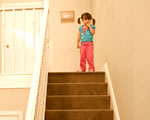 Go to main content
Go to main content
Archive Website of the UK government
Please note that this website has a UK government accesskeys system.
Main menu
Page menu
Parents

Guarding children against trips and falls

Every year over 390,000 children under the age of 15 are taken to hospital with injuries resulting from a fall at home or in the garden. Although most falls are not serious, some can lead to injuries with long term consequences. Putting the following safety checks in place can help your child avoid a serious injury.
In the home - general safety tips
- bunk and cabin beds are not suitable for children under six – if you do have bunk or cabin beds teach your child never to play on the top bunk
- use safety glass in glass doors and windows or cover the panes with safety film or cardboard – this will stop children being seriously cut if they trip or fall into the glass
Stairs and banisters
Safety in the home

Watch a video on YouTube about preventing falls in the home
- when your baby starts crawling, fit safety gates to stop them climbing up or falling down stairs
- accidents happen when young children climb over or through banisters – if gaps are more than 6.5 cm (2.5 inches), cover the gaps with boards or safety netting
- board up any gaps in horizontal rails as they are easy to climb
- make sure that stairs are free from clutter like toys or clothes
- encourage older children not to play on stairs or run up and down them
Windows
- fit window locks or safety catches to stop windows opening more than 6.5 cm (2.5 inches) – this should stop children being able to squeeze through
- move furniture like beds and chairs away from windows to stop children climbing up and falling out
Balconies
- keep younger children away from balconies unless you are with them
- keep balcony doors locked when not in use
- to make sure children are safe, there should be a barrier at least 110 cm (43 inches) high around the edge of the balcony
- if the gaps between the upright railings on a balcony are more than 6.5 cm (2.5 inches), board them up
Outside
- encourage children not to climb on roofs or other high areas like sheds and fences
- if you allow your child to play in trees, make sure the branches are pruned to stop them climbing higher than you could easily get them down
- put play equipment (like swings, slides etc) over something soft like well-watered grass or a mat – never over paving, tarmac or concrete
- if play equipment in playgrounds is old or damaged – or is not over a soft surface, avoid using it
- encourage children to wear a properly-fitting cycle helmet whenever they ride a bike – both on and off the road
Babies
Although babies have limited mobility, they can still wriggle, kick or roll themselves into dangerous situations. Follow these tips to help keep them out of harm’s way:
- don’t leave a baby unattended on any raised service
- always change a baby on the floor to reduce the risk of falling
- if your baby is in a car seat or a bouncing cradle, put it on the floor, not on a high surface
- remove large cot toys from a baby’s cot once they can sit up or get on all fours, as babies can use toys to climb out of the cot
- if you carry a baby down stairs, always keep one hand free to use the hand rail – in case you slip or lose your balance
- never allow a toddler to carry a baby down stairs
- when securing a baby in a high chair, pram or pushchair, always use a five point harness (two shoulder straps, two hip straps and a crotch strap)
- if you are buying a harness separately, look for one made to British Standard 6684
- only use baby walkers to British Standard EN 1273:2005 – baby walkers with older standards are less safe
- never leave a baby alone in a baby walker
In an emergency
If your child has been knocked unconscious in a fall:
- dial 999 immediately and ask for an ambulance
- let the ambulance service know if your child is conscious or unconscious – they will tell you what to do while you are waiting
If your child becomes conscious while you are waiting, tell them to stay as still as possible.
First aid courses
It is a good idea for all parents and carers to learn first aid. For further information on first aid courses, click on the links below.
Child Accident Prevention Trust (CAPT)
The information on this page is provided by CAPT. For more information about children’s accidents visit the Child Safety Week website.
 Facebook
Facebook Twitter
Twitter StumbleUpon
StumbleUpon Delicious
Delicious Reddit
Reddit